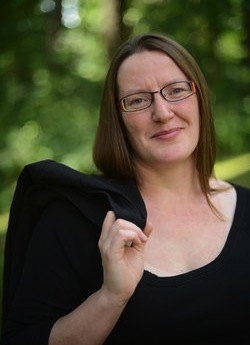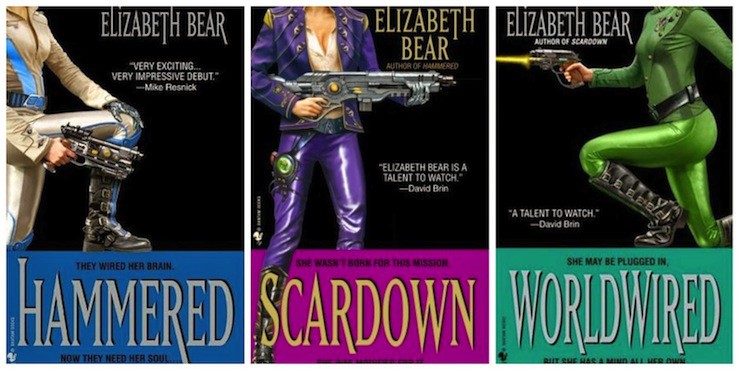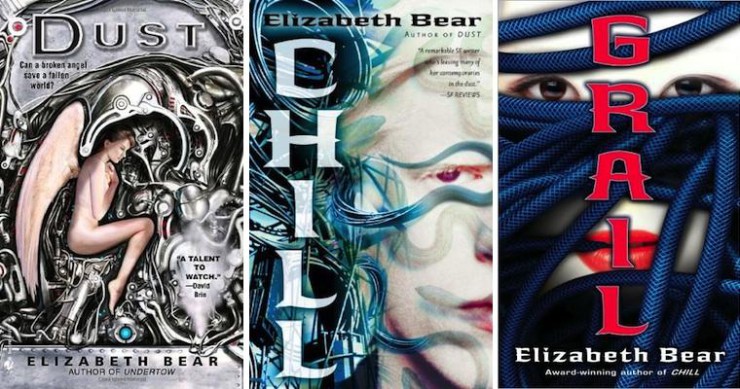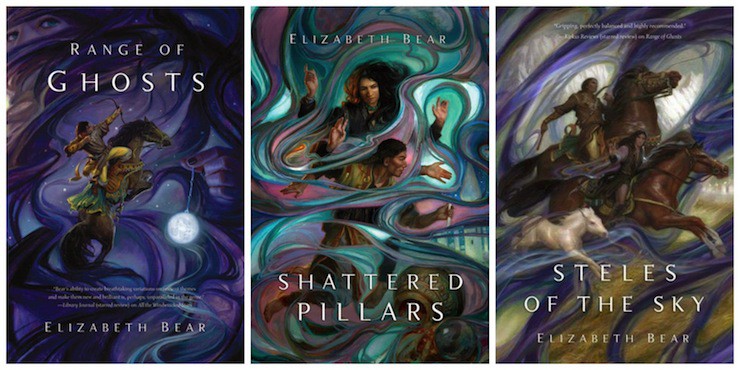Welcome back to the Tor.com eBook Club! October’s pick is Elizabeth Bear’s Range of Ghosts, book 1 in the Eternal Sky epic fantasy trilogy. A prolific writer, Bear has written in a number of other genres, from Lovecraftian to steampunk—so where do you want to start?
Elizabeth Bear is a frighteningly prolific writer. In a novel-writing career that’s just about to enter its second decade, she’s published twenty solo novels, three novellas and mosaic novel in her New Amsterdam series, one trilogy co-authored with Sarah Monette, and two collections of short fiction—which do not, by the way, collect all her extant short fiction. She’s collected a John W. Campbell Award and two Hugo Awards for her fiction, putting her in a fairly small club…
…and she keeps writing more. Which means if you haven’t been reading her stuff all along, you might feel a bit daunted trying to figure out where to start. Because the thing about Bear? She’s not just a prolific writer. She’s a writer who jumps subgenres, and sometimes styles, from book to book and series to series, and absolutely in her short fiction. She’s always trying something new.
So where should you start?
That depends on what you’re looking for. SF, fantasy, epic fantasy, steampunk, spies? What floats your boat?
If you’re like me, and prefer novels to short fiction, you could always try in order of publication. I started reading Bear’s novels in 2005, with her “Jenny Casey” trilogy: Hammered, Scardown, and Worldwired. They’re… I suppose you could call them cyberpunk, but I think of them much more as near-future thrillers with a really high bodycount, a technological arms race, and absolutely fantastic characters. Also the AI-avatar of Richard Feynman. Scardown does some fairly brutal rearranging of the Canadian geological landscape: this is not a cheery-happy trilogy. But it’s gripping, and it’s good. And it’s a great place to start, because Bear’s skill at storytelling only gets better from here.
My personal favourite of her SF novels—so far, at least—is Carnival. Two diplomat-spies arrive on a planet ostensibly to negotiate repatriating artwork, but with orders to lay the groundwork for a hostile takeover. Vincent and Michaelangelo used to be partners and lovers. But Vincent has been brought back from retirement, and Michaelangelo brought back from rehabilitation—their government doesn’t approve of homosexuality—for this last mission. Neither of them know if they can trust either other. Neither one of them knows the other has plans that go beyond following orders. And their matriarchal hosts on New Amazonia have problems and agendas of their own. It’s such a vivid book, vital and alive: I reread it regularly. (I might really like books about spies.)
If SF is your thing, you might prefer to try starting with the “Jacob’s Ladder” trilogy: Dust, Chill, and Grail, available as ebooks in the UK under the author’s preferred titles of Pinion, Cleave and Sanction. Set—largely—aboard the generation ship Jacob’s Ladder, these are immensely atmospheric books, telling a story of conflicted loyalties, family, survival, and social—and biological—change. What does it mean to be human? What will you sacrifice, and how will you change?
And, you know, sense of wonder might be an SFnal cliché, but this trilogy has the weird and wonderful—and amazing—by the bucketload, from talking carnivorous plants to the necromancer’s library of trees, and from winged engineers to ship’s angels. The characters are all really strongly drawn, and the conclusion, when it comes, is startling—and appropriate.
Maybe you prefer fantasy. What kind of fantasy? Epic? Historical? Steampunk? Personally, I’d say start with Karen Memory, a rollicking adventure story set in a steampunk Pacific Northwest city. The narrator, Karen, works in a relatively upmarket brothel, but when late one night an injured woman stumbles in the brothel’s door, bringing with her another woman who’s escaped from sex slavery in the stews by the city’s docks, it sets in motion a train of events that include murder, political corruption, international agents, and a souped-up Singer sewing machine vs. a submarine with tentacles. But what really makes Karen Memory are the characters. And the slowly-developing relationship between Karen and Priya. This is a modern-day old-fashioned adventure story, with romance and explosions. It might be my favourite novel of 2015: I’m a little biased.
But maybe you prefer epic epic. How about a continent-spanning story of gods, war, magic, inheritance, love, and loss? The “Eternal Sky” trilogy has all of that and more. It’s an extraordinary piece of work, possibly Bear’s best: complex, nuanced, layered. And full of everything you could want from an epic fantasy: battles, betrayals, demonically-induced illnesses, rocs, amazing characters, really interesting cosmology…
…maybe that last isn’t on everyone’s list.
Or perhaps you’d prefer some historically-based fantasy. How well do you like William Shakespeare and Christopher Marlowe? Ink and Steel and Hell and Earth is a duology about poets, death, angels, devils, other mythological beings, and the fate of Kit Marley’s mortal flesh and immortal soul.
Here’s the thing. You can pretty much start anywhere with Bear’s work, and be guaranteed a novel full of interesting characters, one that knows how to pull a narrative arc to an explosive conclusion. But if you’d rather try the short stuff, Shoggoths in Bloom is a collection that includes the Hugo-Award-winning titular novelette, “Shoggoths in Bloom,” and the Hugo-Award-winning “Tideline.”
My own recent favourite of her short fiction, though, is “This Chance Planet,” right here on Tor.com, which includes the memorable paragraph:
This is how women sometimes turn into witches. We come home from work one day too many to discover our partners curled up on the couch like leeches in a nice warm tank, and we decide it’s better to take up with a hut with chicken legs.
A good chicken-legged hut will never disappoint you.
Go. Read. Come back if you want to argue.
This article was originally published November 6, 2015.
Liz Bourke is a cranky person who reads books. She has recently completed a doctoral dissertation in Classics at Trinity College, Dublin. Find her at her blog. Or her Twitter.













